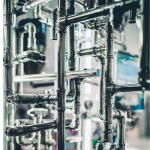New Jersey Future Blog
Lead in Drinking Water in Public Schools: State Assistance Accelerates the Solution in New Jersey
September 13th, 2021 by Gary Brune

Photo credit: Canva
When New Jersey’s public schools were last tested for lead in drinking water in 2016, the extent of potential exposure was pervasive. Based on research conducted by the Trenton Bureau of the USA TODAY Network in 2019, approximately 480 school buildings across a third of the state’s school districts recorded lead levels that exceeded 15 parts per billion, the action level set by the federal government. Given the severity of the problem and the significant cost of remediation, it was clear that state assistance was necessary to protect students and teachers.
On July 1, 2021 Governor Murphy signed legislation (A-5887) that appropriated $6.6 million in state grants for water infrastructure improvements in public schools. This represents the first issuance of grants authorized under the Securing Our Children’s Future program administered by the NJ Department of Education (NJDOE). A total of $100 million in state bonds was approved for this initiative by voters in November 2018. The subsequent regulations promulgated by the NJDOE identified two categories of eligible projects: improvements to drinking water outlets and remediation of major segments of a school’s water distribution system (e.g., replacement of lead service lines or wells).
The approved grants include a $4.1 million appropriation for Jersey City, as well as Shore Regional’s (Monmouth County) plan to use part of its $70,721 grant to install an automated flushing system, a new, low-cost technology that has been successfully implemented elsewhere to keep lead from leaching from pipes into water.
Anecdotally, it appears that the pandemic limited the number of applications submitted to the NJDOE as school districts focused on securing federal aid to ensure ongoing operations. According to the Department, the next round of grants (funded by approximately $93 million in remaining funds) will be issued after the districts perform their cyclical testing of lead in drinking water, which must be completed by the end of June 2022. (This link provides an overview of the NJDOE’s testing-related regulations under N.J.A.C. 6A:26-12.4.) The NJDOE’s approach will help ensure that the next round of grant applications is based on the latest testing results.
The NJDOE issued a broadcast on July 2, 2021 notifying those districts whose grants were approved by the Legislature. The full list of substantially approved grants can be accessed on the Department’s School Facilities webpage.
Related Posts
Tags: drinking water, lead service line, water infrastructure
















